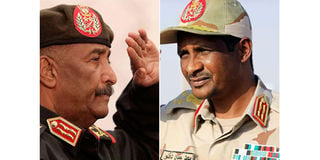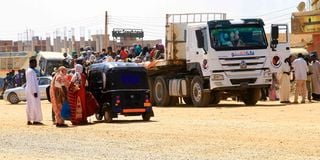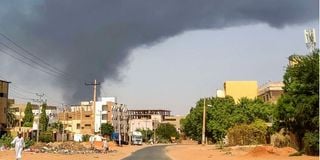Sudan army chief won't meet enemy general: govt official

Sudan's army chief Abdel Fattah al-Burhan (left) and Rapid Support Forces commander Gen Mohamed Hamdan Daglo 'Hemedti'.
Khartoum,
Sudan's army chief is not ready to meet the enemy general he's been at war with for eight weeks, a government official said Tuesday after a regional bloc proposed a face-to-face encounter between the two.
At a summit held in Djibouti on Monday, the East African Inter-Governmental Authority on Development (IGAD) announced it would expand the number of countries tasked with resolving the crisis, with Kenya chairing a quartet including Ethiopia, Somalia and South Sudan.
Sudanese army chief Abdel Fattah al-Burhan and his former deputy Mohamed Hamdan Daglo, known as Hemeti, have been at war since April 15 after they fell out in a power struggle following a 2021 coup that derailed Sudan's transition to democracy.
A draft communique of the IGAD meeting released by the office of Kenyan President William Ruto said the quartet leaders would "arrange (a) face-to-face meeting between (Burhan and Daglo)... in one of the regional capitals."
The Sudanese government official, not authorised to speak to the media, told AFP that, "in the current circumstances Burhan will not sit at the same table as Hemeti," who commands the paramilitary Rapid Support Forces.
The two generals early in the war described each other as criminals, and both sides have failed to respect multiple truces.
On June 1 the United States imposed sanctions on the two warring groups, but fighting has continued, including in Khartoum on Tuesday where witnesses reported artillery strikes in the north of the capital and its suburbs.
More than 1,800 people have been killed since battles began, according to the Armed Conflict Location and Event Data Project (ACLED).

People walk near the rubble at a house that was hit by an artillery shell in the Azhari district in the south of Khartoum on June 6, 2023.
Fighting has forced nearly two million people from their homes, including 476,000 who have sought refuge in neighbouring countries, the United Nations says.
A record 25 million people -- more than half the population -- are in need of aid and protection, according to the UN.
Mediation
Meanwhile, the United States says is increasingly frustrated with Sudan's warring generals and will decide in the coming days with its partners how to proceed on mediation, officials said Tuesday.
"We think we've given them every shot," a senior State Department official said on condition of anonymity.
The United States, which has led negotiations with the Saudis in their port city of Jeddah, has offered to the generals "a way forward that doesn't involve achieving an outcome that's based on violence or military dominance."

People flee the southern part of Khartoum as street battles between the forces of two rival Sudanese generals continue on April 21, 2023.
"They are clearly not taking advantage of the format that we've given them," the official told reporters.
The United States is consulting with Saudi Arabia and other Arab and African states about the "next way forward."
"I think we'll come forward with a recommended approach in the next few days."
The United States and Saudi Arabia had already warned Saturday that they could suspend mediation efforts after the collapse of multiple ceasefires.
Violence erupted in mid-April between the Sudanese army and the paramilitary Rapid Support Forces, which refused to integrate as part of a plan to transition to civilian rule.
"I think a real question that we're facing is how much more mileage do we think you might get out of Jeddah on that step-by-step approach?" another US official said.
More than 1,800 people have been killed and nearly two million displaced by the fighting, according to the Armed Conflict Location and Event Data Project.
Saudi Arabia on Tuesday also announced an international conference next week to gather aid pledges for Sudan.
The United States has employed sanctions and other tactics to pressure Sudanese army chief Abdel Fattah al-Burhan and his former deputy turned rival Mohamed Hamdan Daglo.
Crimes against humanity
Elsewhere, the head of the United Nations mission in Sudan said Tuesday that attacks in Sudan's Darfur region could amount to crimes against humanity.
Darfur has never recovered from years of fighting that began in 2003, and since April has been a centre of the now eight-week-old war between Sudanese army chief Abdel Fattah al-Burhan and his former deputy Mohamed Hamdan Daglo, known as Hemeti, who leads the paramilitary Rapid Support Forces (RSF).

Men walk down a street in Khartoum on June 8, 2023, as smoke rises from behind buildings amid continuing fighting between the army and paramilitary forces. Sudanese army soldiers and paramilitaries fought for control of a military facility on June 8, in Khartoum where a fire raged at an oil and gas facility, witnesses said.
"There is an emerging pattern of large-scale targeted attacks against civilians based on their ethnic identities, allegedly committed by Arab militias and some armed men" in RSF uniform, Volker Perthes, head of the UNITAMS mission to Sudan, said in a statement.
"These reports are deeply worrying and, if verified, could amount to crimes against humanity."
He said the situation in Darfur "continues to deteriorate" and expressed particular alarm about El Geneina, the capital of West Darfur state, following waves of violence "which took on ethnic dimensions".
Another UN official, Toby Harward of the UN refugee agency, previously said hundreds have been killed in Darfur, on the border with Chad.
In 2003, rebels in Darfur rose up against Sudan's Arab elites they accused of monopolising political power and wealth.
The Islamist-backed strongman then in power, Omar al-Bashir, responded by unleashing the Janjaweed militias, whose atrocities shocked the world.
The unrest killed at least 300,000 people and displaced 2.5 million, according to the UN. The bloodshed led to international charges of genocide, crimes against humanity and war crimes against Bashir and others.
Daglo, from Darfur's pastoralist camel-herding Arab Rizeigat people, rose to prominence with the Janjaweed, which made up the bulk of the RSF formed in 2013.
Darfur governor Mini Minawi, a former rebel leader now close to the army, on Saturday, said on Twitter that "what is happening in El Geneina and in Kutum should lead to an international investigation".
Last week the Sudanese authorities loyal to the army declared Perthes "persona non grata", accusing him of taking sides in the conflict. Perthes was outside Sudan at the time.
The UN expressed support for him and said his status had not changed. It said the declaration of "persona non grata" violated international law.





